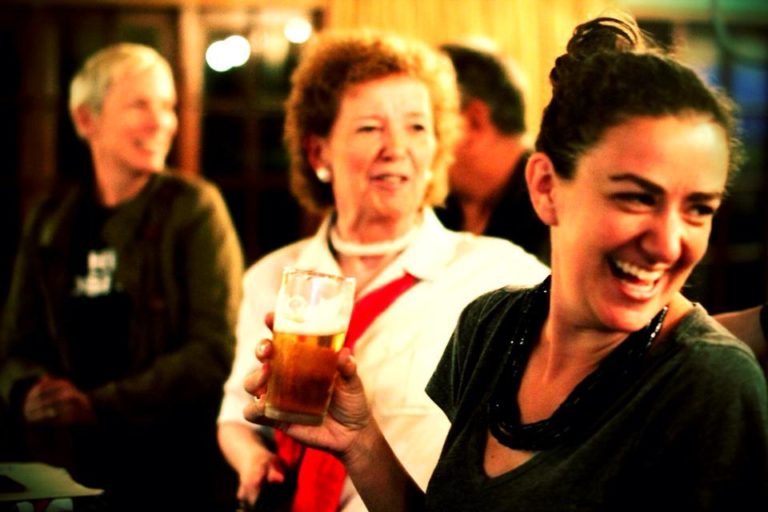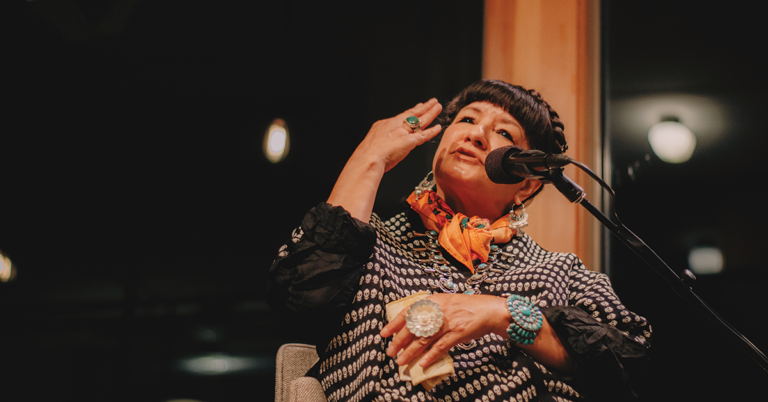
From left to right: singer Annie Lennox, former President of Ireland Mary Robinson, and the author sharing a pint in Malawi. Image by John Cary, © All Rights Reserved.
They Call Us the “Nones,” But We’re So Much More
One fifth of the U.S. public — and a third of adults under 30 — are religiously unaffiliated, the highest percentages ever according to the Pew Research Center.
They call us the “nones.”
I gotta tell ya, I don’t love the idea of my spiritual life being defined by an absence rather than a presence. Sure, I’m not Catholic, not Buddhist, not Muslim. But I am a lot of things…
I was a girl who — at 11 years old — wrote a letter to then President George W. Bush that said, “I understand that war is not pretty, but is there a way to make it bearable? I am trying to tell you that I, along with millions of other people, would very much appreciate it if there were as few causalities as possible. That means both American and Iraq [sic] people. I know that there must be some, but please, let’s try to keep the number down.”
I was a teenager who painted Lauryn Hill lyrics and e.e. cummings poems and quotations on the inside of my closet doors, including this one by a little known nun named Mary Lou Kownacki that still accompanies every single email I send out into the universe:
“Engrave this upon your heart: there isn’t anyone you couldn’t love once you heard their story.”
I was a college student who became all but obsessed with political theory, because of an inspired professor (isn’t it always, that?) who made Plato’s “examined life” and Rousseau’s ideas about the social contract and King’s about the “beloved community” come alive in a packed lecture hall filled with wide-eyed young women with sweaty iced coffees and spiral notebooks. (I am so grateful I went to college before it became customary to bring laptops to class.)
I was a young woman who spent much of my 20s thinking that maybe I was meant to go to divinity school, in large part because I couldn’t figure out where people were having conversations about the “examined life” after they walked across graduation stages to grasp their overpriced diplomas. Then I sat in on a few classes at Union Theological Seminary and realized that I didn’t actually care about the history of the Bible, as much as I wished that I did. I just wanted to talk about how to live a meaningful life with smart, kind people.
I was a newbie writer who stumbled into a big, fancy book deal while the rest of my starving artist friends were, well, still starving and the isolation was terrifying. To counter it, I created the Secret Society for Creative Philanthropy — giving ten of my friends and asking them to give it away in some thoughtful, creative way and then come together one month later to tell the tale. The “beloved community” — it turns out — sometimes gathers in bars and shouts over the crowd about making worth of lasagna, giving taxi drivers insanely large tips, and realizing that this kind of generosity is less about the money and more about the actually seeing other people part.

I am a new mother. Giving birth to a baby almost eight months ago was the most spiritual experience I’ve ever had. My reality crashed into the miraculous, not in one fell swoop, but in nine-plus months of curiosity, bewilderment, and a strange but undeniable craving for gummy worms. Then the world cracked open and Maya came through. Her wrinkled nose smile followed shortly, as did her default disposition of absolute delight.
I am a woman who lives in Oakland in a co-housing community built on the foundational idea of “radical hospitality.” It’s wildly intergenerational. Louise, well into her 70s, can be spotted crossing the courtyard with beans sticking out of her pockets (she’s the keeper of all garden smarts) and Jack, almost a year old, is just learning to stumble along toward the blackberries that Louise so lovingly tends. Our neighborhood is part corner stores and wig shops and part hipster coffee shops and yoga studios; in the mix of it all, I find so much to delight in and worry about (no, I’m not using the word gentrification because I think it’s become a closing rather than an opening). We re-negotiate the “social contract” here every day through tiny, intentional acts — feeding one another’s pets, loving one another’s children, smiling at the old dudes who sit outside of the donut shop each morning.
The texture of my spiritual life may not fit into labels that pollsters or politicians understand, but I’m not not religious. I’m deeply drawn to conversations about what makes an ethical, meaningful life, about race and gender and class and everything else that defines us and makes us wounded and strong. I am desperate to understand how to live in a way that reflects my values, how to be good to the people I love, how to stay awake.
Sometimes I’m judgmental (a hallmark of religiosity, no?) and I often wake up in the middle of the night flooded with anxiety. (I can’t help but notice this happens when I’m taking myself too damn seriously.) But I try to acknowledge both ugly emotions when they arrive and then wish them on their way. As a million wiser people than me have already asserted, it’s gratitude that seems to be the best antidote to the whole range of my less attractive states. I meditate erratically. I pray frequently. I wonder constantly.
That’s who you will find here each week on Friday — someone who doesn’t affiliate with one religion but affiliates with the burden and joy of trying to understand how to be a good human. I hope it will be more of a conversation than a monologue. I can’t wait to meet you.

